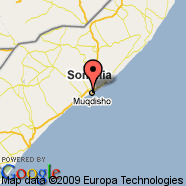Somalia: You Really Can’t Make This Stuff Up
 November 5, 2009: The British couple taken by pirates on October 24, have become the focus of over a week of fighting between pirates and Islamic radical groups. Some of the pirates holding the couple want to sell the two Brits to an Islamic radical group. But some pirates do not want to sell the two captives off cheap, and local warlords don’t want to see the radicals take control of the two British captives. The fear here is that the couple might attract a British commando raid to free them. Somalis have bad memories of over a century of British military operations in the area, and the reputation of British commandos. Although the British left in the 1960s, the Somalis do not want to fight the British troops. The Islamic radicals are less practical, and would welcome a fight with British commandos, even if they lose. This would make them martyrs to Western imperialism. The other Somali groups are more interested in power and money. The latter group kept control of the couple and took them to the central Somalia port town of Haradheere (300 kilometers north of Mogadishu). Last Summer, rival clans fought over land and other disputes there, causing over fifty casualties during several days of fighting. The town is a pirate base, and things have quieted down.Al Shabaab is increasing the pressure on women in areas they control. Women are being beaten for not wearing socks (the naked ankle is considered sinful) while going to and from the marketplace. Moreover, al Shabaab has forbidden women from working outside the home, beating any they find defying their order. This, and a general hostility to foreign ideas, is causing more aid organizations to shut down in al Shabaab controlled territory. Five foreign aid groups recently shut down were involved with improving the lives of women.
November 5, 2009: The British couple taken by pirates on October 24, have become the focus of over a week of fighting between pirates and Islamic radical groups. Some of the pirates holding the couple want to sell the two Brits to an Islamic radical group. But some pirates do not want to sell the two captives off cheap, and local warlords don’t want to see the radicals take control of the two British captives. The fear here is that the couple might attract a British commando raid to free them. Somalis have bad memories of over a century of British military operations in the area, and the reputation of British commandos. Although the British left in the 1960s, the Somalis do not want to fight the British troops. The Islamic radicals are less practical, and would welcome a fight with British commandos, even if they lose. This would make them martyrs to Western imperialism. The other Somali groups are more interested in power and money. The latter group kept control of the couple and took them to the central Somalia port town of Haradheere (300 kilometers north of Mogadishu). Last Summer, rival clans fought over land and other disputes there, causing over fifty casualties during several days of fighting. The town is a pirate base, and things have quieted down.Al Shabaab is increasing the pressure on women in areas they control. Women are being beaten for not wearing socks (the naked ankle is considered sinful) while going to and from the marketplace. Moreover, al Shabaab has forbidden women from working outside the home, beating any they find defying their order. This, and a general hostility to foreign ideas, is causing more aid organizations to shut down in al Shabaab controlled territory. Five foreign aid groups recently shut down were involved with improving the lives of women.
Al Shabaab has also banned musical ringtones for cell phones, and insisting that clerics, reading verses from the Koran, be used instead. Al Shabaab is wary of cell phones, which are very popular, and cheap. Most young men, and many young women, have then, and this new form of communication has enabled the kids to operate more freely than in the past. More of them, for example, are skipping the usual arranged marriage and just taking off with lovers. Al Shabaab does not like this, or any other free-thinking actions facilitated by cell phones. There are nearly two million cell phone users, with about 18 percent of Somalis having one (compared to 40 percent in their southern neighbor, Kenya). Local service can be had for $10 a month, while overseas calls cost about thirty cents a minute.
Somali pirates are trying a little PR to improve their image. Their basic line is that they are being forced into piracy because foreign fishing boats are illegally fishing off the Somali coast and depriving Somali fishermen of their livelihood. Foreign fishing boats have stayed out of Somali coastal waters for over a decade, because of the lawlessness. In some cases, local warlords sold “protection” to foreign fishing boats, but competing warlords attacked anyway, and the protection scam fell apart. The foreign fishing boats being attacked now are either far off the coast (often 1,000 kilometers or more), in international waters, or in Yemeni coastal waters.
Another criminal enterprise, dumping toxic waste in Somali waters (or buried on land) has also run afoul of warlord conflicts, and the fact that no one is in charge. The legal disposal of the toxic waste (via an expensive facility that breaks the stuff down into harmless elements) has led to an international criminal enterprise where gangs offer to make the toxic waste go away, for a lower price, and then shop for a country where the local authorities, or criminal gangs, will take the stuff and bury it. Dumping it at sea is risky, because currents might take it to someplace where is can be detected, and traced to those who created it, and paid gangsters to deal with it.
Al Shabaab is still fighting its Islamic radical rival Hizbul Islam. Al Shabaab has declared itself an ally of al Qaeda, Hizbul Islam has not. Thus Hizbul Islam is considered “moderate,” but they are still very conservative in terms of religion and lifestyle, and hostile to the Transitional Government and foreigners. Al Shabaab is believed to be larger (with a few thousand members, including hundreds of foreign Islamic terrorists, most of them armed) than Hizbul Islam, but does not have as many local allies. The two Islamic radical groups failed to work out a peace deal, and have been skirmishing with each other for over three months.
The Transitional Government has lost control of the border town of Beledweyn. Local warlords have allied themselves with Islamic radical groups, because of  disagreements with the government (over the earlier use of Ethiopian troops to chase the Islamic radicals out). The Ethiopians want to force al Shabaab away from the border, to lessen the risk of another invasion by Islamic radical Somalis.
The port of Mogadishu has been shut down because the Transitional Government is trying to impose security checks on cargoes coming in. This is to thwart arms smuggling. The merchants refuse to go along, not just because they want to keep importing arms, but because the delays for the security checks would make their cargoes vulnerable to mortar attacks. The port workers have gone on strike, and little cargo is moving through the largest port in the country. The port reopened three years ago, and is guarded by AU peacekeepers. But that doesn’t keep the al Shabaab mortar shells out.
November 2, 2009: Two armed men tried to hijack a small airliner flying from Puntland to Djibouti. Over a dozen passengers subdued the men, who were arrested by police when the plane landed. Off the Yemen coast, Somali pirates seized a Yemen fishing boat. The fishermen fought back, killing one pirate and wounding another. The pirates took the stolen boat back to Somalia. Large boats like this are used as mother ships for pirates operating a thousand or more kilometers off the Somali coast. Some 700 kilometers from the Kenyan coast of Mombasa, a U.S. cargo ship carrying food aid, was attacked by two speedboats full of pirates. The American crew prevented the pirates from climbing aboard, and got away.
November 1, 2009: Some 22 kilometers off the northeast coast, Norwegian sailors moving among a group of dhows, looking for pirates, were fired on by a dhow that was manned by pirates. The Norwegians retreated, while returning fire, and killed two of the pirates. When the pirates got back to Puntland, it was reported that three others on the boat were wounded. One of the dead, and one of the wounded, were from Yemen (where many fishermen have joined Somali pirate or smuggling gangs.) The Norwegian boarding party were from a nearby Norwegian warship that was part of the anti-piracy patrol.
October 31, 2009: Â There has been some more shooting on the Puntland/Somaliland border. The two nations are continuing a battle over disputed territory, and the latest battle left over a dozen casualties.
October 30, 2009: Â Far off the coast, a Spanish tuna boat employed armed guards to fighting off a pirate attack. But a Thai Tuna boat, with a crew of 23 Russians, was taken by pirates, and moved towards the Somali coast.
Fearing a British commando raid to free their two British hostages, pirates moved their captives inland. The pirates are demanding a $7 million ransom for the two. But their captives are not rich, nor are their families, and the British government refuses to pay the ransom.
_____
Strategy Page
Comments
comments
 Calendar
Calendar






































